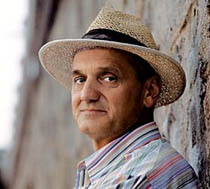
Multifunctional David Vávra is enchanted by almost everything
 |
"I like to drive the same car, go to the same café in the same city at the same time,” smiles the notorious creator of mischief. "I have these things in life set out very simply. Since I was four, I have known what I would be, I have lived in the same house my whole life, and I have the same friends."
In his studio, designs for "square and round" houses are created. He is known for the playfully cubist reconstruction of Švandovo Theater. He transformed a formaldehyde shack into the original summerhouse Vendula for the recreational facility of prison guards in Horní Bezděkov. He reconstructed churches in Prague-Braník and Modřany, and created the interiors of the Akropolis Palace with František Skála.
His handwriting is evident in the interior of the U kapitána Nema gym in Prague 6, the interior of the bar of the Divadlo in Celetná, or the basement theater Dobeška. He considers architecture his main interest, as "the theater has pleasure in it, but also the fleetingness of the moment. Architecture lasts."
The television series Šumná města made a media star out of him: "It was meant to be entertaining, but also regional and educational in the sense that the creations of recent ancestors should not be destroyed. So that people feel shame when demolishing a baroque chapel or when destroying a functionalist building." Vávra, as a peculiar figure, guides viewers through modern architecture in various disguises on different means of transport. He even presented a quirky German course Alles Gute on television.
Vávra's spider-like visage can sometimes be spotted in the Vinohrady café Kaaba, furnished in a pronounced playful Brussels style that pleases him with its pastel colors and fondness for irregular curves: "I am very close to the cosmically designed objects of the 60s. They contain my youth, but also a certain optimism of the era. To this day, I design houses in pastel colors."
David Vávra's childhood (born March 9, 1957, in Prague) took place during the time of "the first human flight into space, Brussels architecture, the first beats of big beat, plastic kittens, and Bakelite design." He is a graduate of the Faculty of Civil Engineering at the Czech Technical University and the Academy of Fine Arts in Prague.
In the basement of Vávra's childhood home, the famous theater Sklep was also established, a popular Prague "independent" theater scene in the 80s with poetic humor and subtle parody, where Vávra's comic and clownish talent was utilized. According to him, Sklep was not so much a theater as a life philosophy that could be summed up in the phrase: Don't take anything too seriously.
Vávra became a debuting poet "by chance and out of necessity,” from the need to spice up his hosting appearances. This led to the collection Oslavné básně. Fifteen ties of David Vávra (1998): "In some poems, I sense real quick-witted national-patriotic pathos." He is also a member of the literary association Kvašňák.
The multifunctional Vávra also actively participates in the football and hockey team Sklepovští sršáni. "When a person has more activities in life, it must be planned terribly simply,” he claims. He expresses his artistic side through collages. He has also acted in the films Kouř, Cesta z města, Kopytem sem, kopytem tam, Mazaný Filip, Pasti, pasti pastičky.
He expresses his thoughts on family only "so cryptically in verses or in mathematical formulas." About his marriage that began twenty years ago in a church in Braník, he says: "It is such a vast amount of boundless warmth, passion, return, argument, misunderstanding, worry, fear, and other things that human speech is too short for it."
With his wife, he raises Maruška, Debora, Viktorie, and Vojtěch. "As a symbolic miracle and at the same time a warning for responsibility,” he explains that they first had to adopt two children before having two of their own. As a believing Christian, he leads his children to church every Sunday: "I know they sometimes find it boring, but for positive things, one sometimes has to nudge a little."
A sense of humor, playfulness, balanced perspective, and tolerance - these are the main traits of Vávra's projects. And also respect for created values: "I am enchanted by almost everything. In a certain sense, I even like the long panel wall in the Prosek estate. Everything that is already history I absorb as a certain value." He can even turn horrible things into positives - he likes the Žižkov television tower because it is supposedly a three-legged tower on which UFOs will one day land.
The English translation is powered by AI tool. Switch to Czech to view the original text source.
9 comments
add comment
Subject
Author
Date
proc?
ja
07.03.07 11:31
souhlas s proc
kendy
08.03.07 03:42
je smutne, ze jeste 20 let od stavby veze jsou dusicky,
Jan Sommer
08.03.07 03:19
její současný nasvětlení ji (alespoň pro mě) zaktualizovalo
kalina
09.03.07 03:45
Hledá-nebo našel
Kahy
27.03.08 02:53
show all comments
Related articles
0
07.03.2022 | Architect David Vávra celebrates 65 years, loyal to his native Dobeška the whole time
0
12.12.2017 | David Vávra: Running with Houses - Exhibition at GAB
0
06.03.2017 | David Vávra - a professional architect and a great dreamer at heart
0
19.09.2012 | Kolín will build a city gallery according to the design of David Vávra








